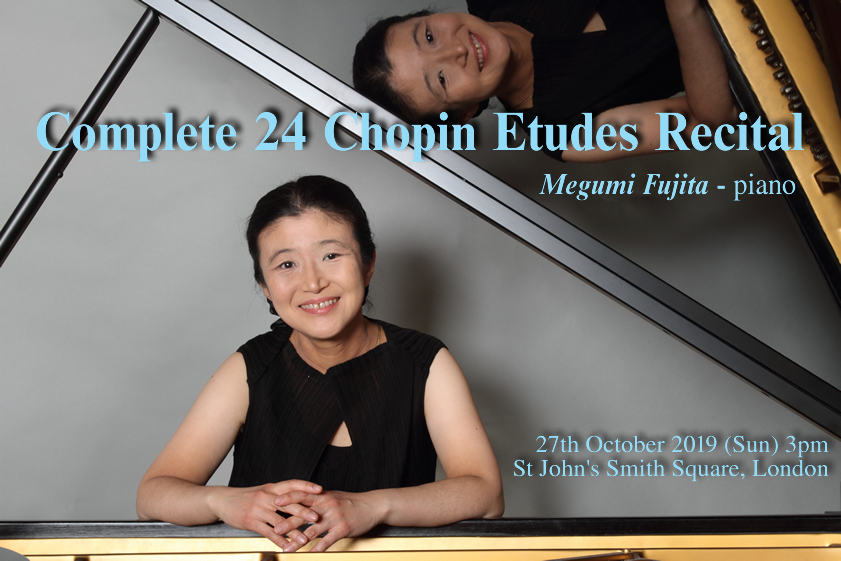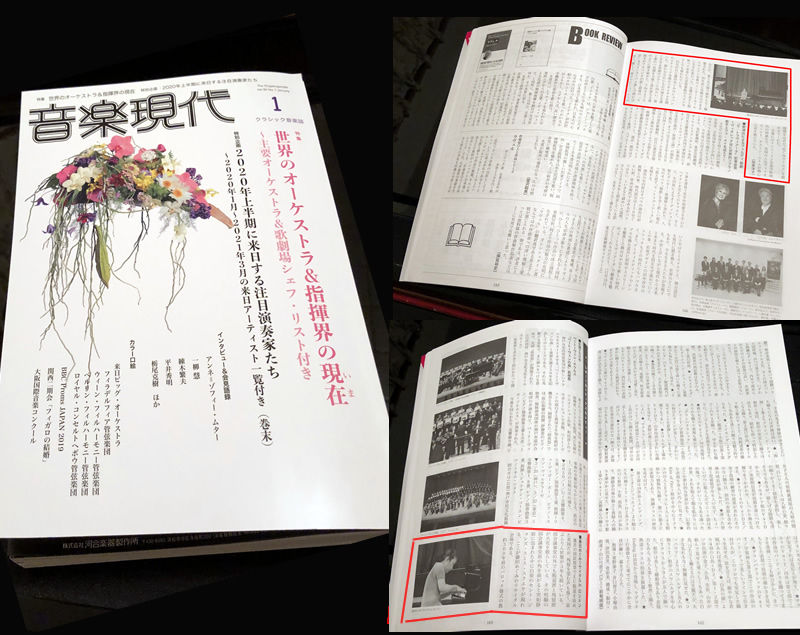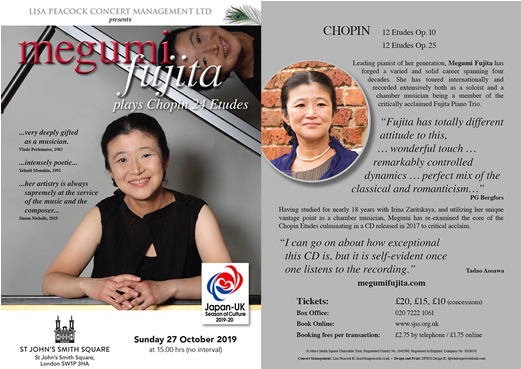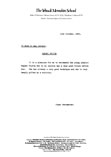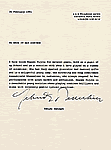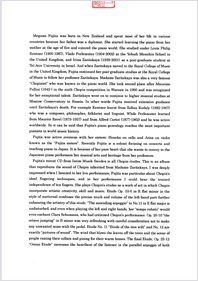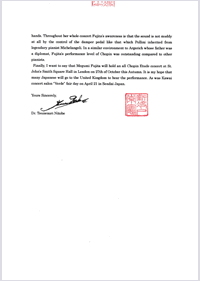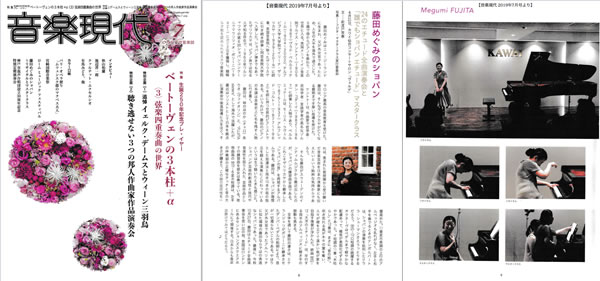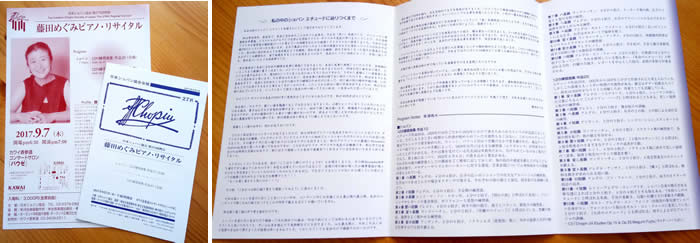
The Complete 24 Chopin Etudes Recital
Chopin
Complete 24 Etudes Recital
12
Etudes Op.10, 12 Etudes Op.25
Sunday 27th October 2019 at 3pm
St
John's Smith Square, London
Happy
New Year!!!
A review just out from Musical
Opinion (Jan-March 2020 issue) of Megumi's
Chopin 24 Etudes at St John’s Smith Square on October 27th 2019!
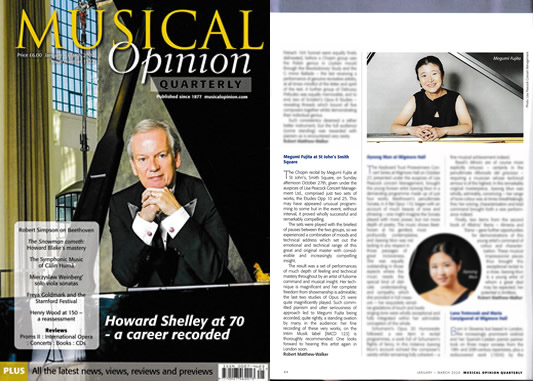
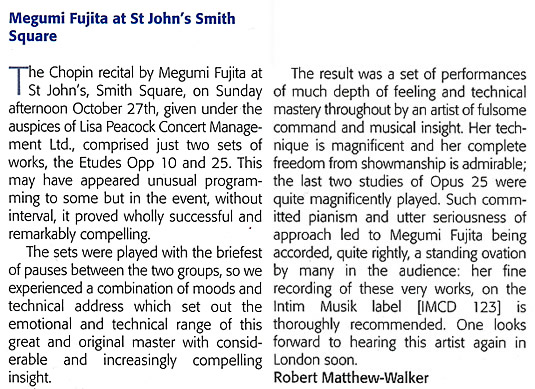
Review on Japanese Ongaku Gendai Magazine!
Ongaku Gendai Magazine January 2020 (translated from original Japanese)
Megumi Fujita Recital in London
Since the controversial Brexit referendum, won by a tiny margin, the remainers are still going strong and the future of the UK has been hanging in a balance for three years.
The leavers and the remainers continues their battle right outside the Houses of Parliament. Once you turn a corner in front of the Houses of Parliament, the hustle and bustle suddenly becomes silent, and the mighty white St John’s Smith Square appears. This is the venue for Megumi Fujita’s recital.
The church was built around 300 years ago in a Baroque style, but was completely destroyed in the Second World War. It was rebuilt 30 years ago while keeping the original exterior, and was reborn as one of the main London concert halls. With its notable acoustics, the hall is also used for BBC music programmes.
Megumi Fujita gave a Complete Chopin Etudes recital here on 27th October.
She sat at the piano with a quiet smile and strong inner determination, and commenced the first Etude in C major like a roaring great cascading waterfall. It drew us in one continuous streak, without an interval, right through to the last Etude ‘Ocean’ of scrolling continuous arpeggio with both hands, she expressed Chopin’s multitude of characters by being sweet, sometimes severe, and refreshing at times, she treated us to ‘Megumi’s World’ incorporated with her adoration to Chopin.
Tasmin Little, the famous British violinist and Megumi’s former school friend from the Menuhin school was in the audience, and was keenly listening to the performance.
Yoko Kaku
Official event of the Japan Season of Culture in the UK
About Japan-UK Season of Culture 2019-2020
Megumi Fujita Piano Recital, Complete 24 Etudes by Frédéric Chopin
Leading pianist of her generation, Megumi Fujita has forged a varied and solid career spanning four decades. She has toured internationally and recorded extensively both as a soloist and a chamber musician being a member of the critically acclaimed Fujita Piano Trio.
Having studied for nearly 18 years with Irina Zaritskaya, and utilizing her unique vantage point as a chamber musician, Megumi has re-examined the core of the Chopin etudes which culminated to a CD release in 2017.
*****
|
'I
can go on about how exceptional this CD is, but it is self-evidant
once one listens to the recording' ***** ***** Megumi
gave a solo performance of three of Chopin’s most popular Etudes
(Black Keys, Thirds and Revolutionary) in which she balanced power
and richness of sound with a wonderful delicacy of touch. |
|
|
Profile ***** Letter from the late Vlado Perlemuter
|
|||||
|
|
13th October 1983 It is a pleasure for me to recommend the young pianist Megumi Fujita who in my opinion has a very good future before her. She has already a very good technique and she is very deeply gifted as a musician. Vlado Perlemuter |
||||
|
Letter from the late Lord Menuhin |
|||||
|
25 February 1991 I have known Megumi Fujita for several years, both as a pupil of my school and as a musician with whom I have played on a number of occasions. She has very special pianistic and musical gifts and is a delightful young lady. Her sincerity and deep commitment communicate themselves to audiences, who always respond to her performance with great warmth and enthusiasm. Megumi Fujita is a remarkable young musician whose playing combines brilliance and drama with intensly poetic lyrical qualities. Yehudi Menuhin |
|||||
|
Letter from Simon Nicholls |
|||||
|
29th May 2019 Megumi Fujita is a pianist of high artistic achievement, who communicates in her playing insights of rare significance. In her performances her artistry is always supremely at the service of the music and the composer; a strong interpretive personality creates a sense of communication with each member of the audience. Simon Nicholls |
|||||
|
Japanese
Ongaku Gendai Magazine Article “Ongaku Gendai” Magazine July,2019 Chopin by Megumi Fujita Complete 24 Chopin
Etude Recital Megumi Fujita was born in New Zealand and spent most of her life in various countries because her father was a diplomat. She started learning the piano from her mother at the age of five and entered the piano world. She studied under Louis Philip Kentner (1905-1987), Vlado Perlemuter (1904-2002) at the Yehudi Menuhin School in the United Kingdom, and Irina Zaritskaya (1939-2001) as a post-graduate student at Tel Aviv University in Israel. And when Zaritskaya moved to the Royal College of Music in the United Kingdom, Fujita continued her post-graduate studies at the Royal College of Music to follow her professor Zaritskaya. Madame Zaritskaya was also a very famous "Chopinist'' who was known in the piano world. She took second place after Maurizio Pollini (1942-) in the sixth Chopin competition in Warsaw in 1960 and was recognized for her exceptional talent. Zaritskaya went on to continue to higher musical studies at Moscow Conservatory in Russia. In other words Fujita received extensive guidance until Zaritskaya's death. For example Kentner learnt from Zoltan Kodaly (1882-1967) who was a composer, philosopher, folklorist and linguist. While Perlemuter learned from Maurice Ravel (1875-1937) and from Alfred Cortot (1877-1962 ) and he was active worldwide. So it can be said that Fujita's piano genealogy reaches the most important pianists in world music history. Fujita was active overseas with her sisters ; Honoka on cello and Arisa on violin known as the "Fujita sisters". Recently Fujita is a soloist focusing on concerts and teaching piano in Japan. It is because of her pure heart that she wants to convey to the Japanese piano performers her musical arts and heritage from her professors. Fujita's recent CD from Intim Musik Sweden is all Chopin études. This is an album that reproduces the sound of Chopin inherited from Madame Zaritskaya. I was deeply impressed when I listened to her live performance, Fujita was particular about Chopin's ideal fingering techniques, and in her performance I could hear the trained independence of ten fingers. She plays Chopin's etudes as a work of art in which Chopin incorporate artistic creativity, skill and music. Etude Op. 10-6 in E flat minor in the style of nocturnal combines the precise touch and volume of the left -hand part further enhancing the artistry of this etude. "The ascending arpeggio" in No.11 in E flat major is undisturbed, and even when playing the left and right hands, her "tempo rubato" would even enchant Clara Schumann, who had criticized Chopin's performance. Op. 25-10 "the octave jumping'' in B minor was very refreshing with careful consideration not to make any unwanted noise with the pedal Etude No. 11 "Etude of the tree wilt' ' and No. 12 are exactly "pictures of sound ". The wind that blows the leaves off the trees and the scene of people raising their collars and pining for their warm homes. The final Etude, Op. 25-12 "Ocean Etude" increases the heart at of the listener in the parallel arpeggio of both hands. Throughout her whole concert Fujita's awareness is that the sound is not muddy at all by the control of the damper pedal like that which Pollini inherited from legendary pianist Michelangeli. In a similar environment to Argerich whose father was a diplomat, Fujita's performance level of Chopin was outstanding compared to other pianists. Finally, I want to say that Megumi Fujita will hold an all Chopin Etude concert at St. John's Smith Square Hall in London on 27th of October this autumn. It is my hope that many Japanese will go to the United Kingdom to hear the performance. As was Kawai concert salon "Verde" fair day on April 21 in Sendai Japan. Yours Sincerely,
From the 7th Sept 2017 programme of Megumi Fujita's Chopin Complete 24 Etudes Recital today at Kawai Omotesando 'Pause' Hall, Tokyo:
My journey to Chopin Etudes Thank you for coming to hear my Chopin Etudes tonight.
I was one of those typical ‘model student’ in my younger years,
as I can immediately play whatever my teachers’ instructed.
When I found out the possibility to study with Irina Zaritzkaya
at Tel Aviv University, with great difficulty, I somehow managed
to get my parents - who were more inclined towards me studying
in the US - to let me study in what was a war torn Israel. I was mimicking everything my teacher said with perfection. Really with amazing detail. I wrote down everything through to a minute detail into my music. I participated in many competitions, so I played the same pieces to her over and over, and wrote in even more detail. Every twice weekly lessons were spent intensively, so one can imagine how much I have improved. However, deep within me, I was insecure, and lacked confidence. I was studiously trying to copy everything my teacher said, but never even thought about applying the idea in other pieces. I did have a level of uncertainty, but as long as I can have lessons with my teacher, wherever she is, I will be set forever. Irina Zaritskaya died suddenly in 2001, when I was in my mid–thirties. I was abruptly left alone to learn new pieces from scratch. I was fine performing music that I was taught, but new pieces are different. I can do what was printed, but emotions did not synchronise with what I was playing. Even if I literally prayed while performing passages that needed to sound like a prayer, the sound never came out as I wished. Something was missing from what is definitely a beautiful music. I had a lot of concerts scheduled at the time, so I went to my late teacher’s daughter Alexandra Andrievsky, who was of similar age to me, in London, and when she moved to Canada, I went to Canada to have lessons. Alexandra Andrievsky, printed at the end of my biography is my late teacher, Irina Zaritskaya’s daughter. I had by then, completely given up making music by myself. In one of the lessons in Canada, I asked ‘how shall I play this phrase?’. Alexandra went silent for a moment and then told me what to do. Now that I think back, perhaps she didn’t go silent to think, but were listening out for a doorbell or a phone, but to me, a person desperate for the answer, the silence felt like a lightening bolt. ‘Should I think deeper!!?’ At that moment I decided to to use my head and search for answers. After that, I stopped going for lessons, and limited listening to other performers in concerts and CDs to a bare minimum. I have only listened to a handful of recordings of the pieces I am performing for the past decades. I have finally started to think deeper and deeper in my own mind. At first, the new pieces which I learned by myself lacked something. I read widely, and went to museums. I tried pouring all my emotions, literally to the point of crying, but the results were not quite there. But I really wanted to find the answers by myself. After few years a revelation presented itself: Pianistic tone colour varies by the weight transmitted from the arm to the keyboard. Simple, but this was the most important discovery. Next revelation came when I found that there are perfect sound for final chords. It was as surprising as a baby finding out that mummy has a name too! After that, small discoveries followed almost everyday, and eventually mounted enough that audiences began to notice and compliment. I am still discovering something new everyday. I have finally gained confidence to make my own unique performance. What I hope you are about to hear is a true representation of the music I hear in my mind. Even though this is named ‘Etude’, it was composed by Chopin, a composer of many heart rendering music. I hope to recreate what I think Chopin himself imagined. I realise this may differ from all the wonderful recordings from the past, and some of you will find it disconcerting. My performance is what I envisage Chopin felt and I have recorded it on a CD and will perform to you tonight. I will be most delighted if you could enjoy with me my performance of what I think Chopin himself imagined. Megumi Fujita
|
|||||
copyright©2019 Fujita Piano Trio all rights reserved.
